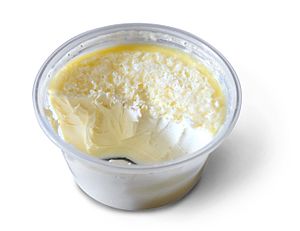 A tub of clotted cream, showing top crust | |
| Alternative names | Clouted cream, Devonshire cream, Cornish cream |
|---|---|
| Place of origin | England |
| Region or state | Devon, Cornwall |
Clotted cream (Cornish: dehen molys, sometimes called scalded, clouted, Devonshire or Cornish cream) is a thick cream made by heating full-cream cow's milk using steam or a water bath and then leaving it in shallow pans to cool slowly. During this time, the cream content rises to the surface and forms "clots" or "clouts", hence the name.[1] Clotted cream is an essential ingredient for cream tea.
Although its origin is uncertain, the cream is associated with dairy farms in South West England and in particular the counties of Devon and Cornwall. The largest commercial producer in the United Kingdom is Rodda's at Scorrier, near Redruth, Cornwall, which can produce up to 25 tons of clotted cream a day.[2]
In 1998, "Cornish clotted cream" was registered as a Protected Designation of Origin (PDO) under European Union law. The designation can be used if the production follows certain requirements, from milk produced in Cornwall and the cream has a minimum fat content of 55%. Following Brexit, the PDO was also registered under UK law. It is recognised as a geographical indication in Georgia, Iceland, Moldova, Montenegro, Norway, Serbia, Switzerland, and Ukraine.[3]
- ^ "BBC - Devon Great Outdoors - Tony Beard's Dartmoor Diary".
- ^ Cite error: The named reference
interviewwas invoked but never defined (see the help page). - ^ "GIs worldwide compilation". Origin GI. 3 September 2021. Retrieved 2 October 2021.